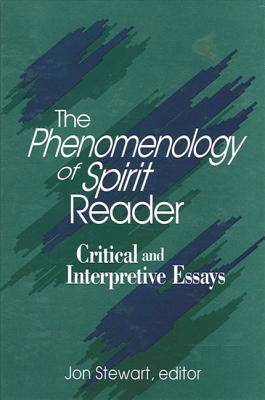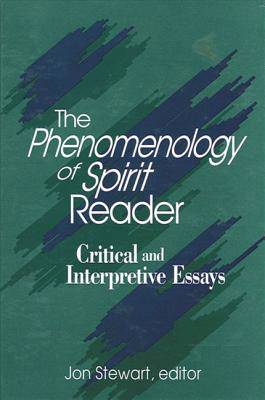
Door een staking bij bpost kan je online bestelling op dit moment iets langer onderweg zijn dan voorzien. Dringend iets nodig? Onze winkels ontvangen jou met open armen!
- Afhalen na 1 uur in een winkel met voorraad
- Gratis thuislevering in België vanaf € 30
- Ruim aanbod met 7 miljoen producten
Door een staking bij bpost kan je online bestelling op dit moment iets langer onderweg zijn dan voorzien. Dringend iets nodig? Onze winkels ontvangen jou met open armen!
- Afhalen na 1 uur in een winkel met voorraad
- Gratis thuislevering in België vanaf € 30
- Ruim aanbod met 7 miljoen producten
Zoeken
The Phenomenology of Spirit Reader
Critical and Interpretive Essays
€ 145,45
+ 290 punten
Omschrijving
The Phenomenology of Spirit was Hegel's first major philosophical work and is considered by many to be his masterpiece. Its several hundred pages treat topics as diverse as Greek drama, religion, medieval court culture, natural science, Romanticism, and the Enlightenment. Hegel regarded it as the introduction to his philosophical system as a whole, and it is often thought to be the most accessible work in his otherwise difficult philosophical corpus. This anthology represents the most complete collection of essays on the Phenomenology in any language. It follows Hegel's table of contents, and all of the major sections of the work are covered. The main goal guiding the selection of essays was to collect the best articles written on the Phenomenology by distinguished international Hegel scholars and at the same time to provide systematic coverage. Although the essays are all by leading Hegel scholars, none of them presupposes any particular in-depth knowledge of Hegel or German philosophy. The object of the book is thus to make the Phenomenology more accessible for students while serving as an impetus for further Anglo-American Hegel research. Among the contributors to the book are Howard Adelman, John W. Burbidge, Martin De Nys, Kenley R. Dove, Katharina Dulckeit, Joseph C. Flay, Moltke S. Gram, Daniel P. Jamros, George Armstrong Kelly, Alasdair MacIntyre, Mitchell H. Miller, Jr., Patricia Jagentowicz Mills, Karlheinz Nusser, David W. Price, John Sallis, Harald Schondorf, Gary Shapiro, Jean-Louis Vieillard-Baron, Kenneth R. Westphal, and Merold Westphal.
Specificaties
Betrokkenen
- Uitgeverij:
Inhoud
- Aantal bladzijden:
- 523
- Taal:
- Engels
- Reeks:
Eigenschappen
- Productcode (EAN):
- 9780791435359
- Verschijningsdatum:
- 15/01/1998
- Uitvoering:
- Hardcover
- Formaat:
- Genaaid
- Afmetingen:
- 152 mm x 229 mm
- Gewicht:
- 843 g

Alleen bij Standaard Boekhandel
+ 290 punten op je klantenkaart van Standaard Boekhandel
Beoordelingen
We publiceren alleen reviews die voldoen aan de voorwaarden voor reviews. Bekijk onze voorwaarden voor reviews.










